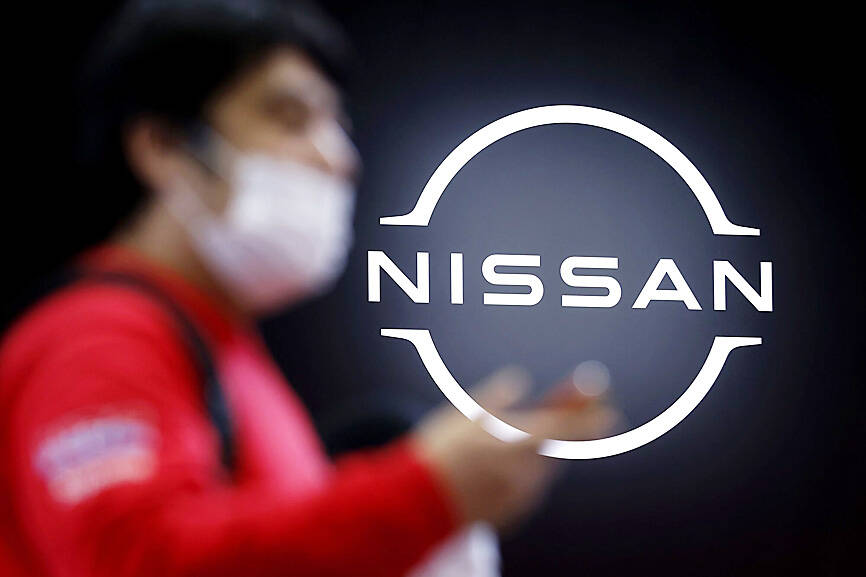Nissan Motor Co might slow a planned ramp-up of electric vehicles (EVs) made in the US after halting output at a joint venture in Mexico, signaling unease about energy and trade policies under US President Donald Trump’s second administration.
The start date and production levels for battery-powered cars to be manufactured at a plant in Canton, Mississippi, would depend in large part on whether Trump and the Republican US Congress follow through on vows to scrap a US$7,500 tax credit and other incentives for EV buyers and makers, Nissan chief planning officer for operations in the Americas Ponz Pandikuthira said.
“If they pull back on the US$7,500 credit, we know the rate of adoption is going to slow,” Pandikuthira said in an interview. “We certainly don’t want to be in a position of building models there’s no demand for.”

Photo: Bloomberg
The carmaker previously said it plans to produce four all-new EVs at the Mississippi factory starting in 2028, but Pandikuthira said Nissan would be ready for production of those vehicles as soon as 2027. However, it might slow-walk the EV start-up and limit volumes in favor of boosting output of increasingly popular gas-electric hybrids, including plug-in models, to be built at its plant in Smyrna, Tennessee.
“We’re staying closely tuned to what happens with regulations,” Pandikuthira said. “We can decide which ones to ramp up and which ones to slow down.”
Nissan is to cancel two Infiniti cars, the gas-powered QX50 and QX55 compact crossovers, as of December in an effort to revamp its ailing premium brand, the carmaker said. They are the only Nissan vehicles made at the Mexican plant it co-owns with Mercedes-Benz Group AG.
The decision was based on low demand for the two older models, Pandikuthira said, adding that Nissan has no plans to cut or shift output at its other facilities in Mexico that make vehicles such as the Kicks subcompact and Sentra compact sedan.
The end of Infiniti’s production in the country follows Trump’s threats to impose a 25 percent tariff hike on Mexico and Canada that could damage sales of vehicles they export to the US.
Nissan is planning as many as 2,000 job cuts in the US this year, a local Japanese media report said on Saturday.
By closing production lines at its plants in Tennessee and Mississippi, it aims to reduce US output by about 25 percent, the report said.

Intel Corp chief executive officer Lip-Bu Tan (陳立武) is expected to meet with Taiwanese suppliers next month in conjunction with the opening of the Computex Taipei trade show, supply chain sources said on Monday. The visit, the first for Tan to Taiwan since assuming his new post last month, would be aimed at enhancing Intel’s ties with suppliers in Taiwan as he attempts to help turn around the struggling US chipmaker, the sources said. Tan is to hold a banquet to celebrate Intel’s 40-year presence in Taiwan before Computex opens on May 20 and invite dozens of Taiwanese suppliers to exchange views

Application-specific integrated circuit designer Faraday Technology Corp (智原) yesterday said that although revenue this quarter would decline 30 percent from last quarter, it retained its full-year forecast of revenue growth of 100 percent. The company attributed the quarterly drop to a slowdown in customers’ production of chips using Faraday’s advanced packaging technology. The company is still confident about its revenue growth this year, given its strong “design-win” — or the projects it won to help customers design their chips, Faraday president Steve Wang (王國雍) told an online earnings conference. “The design-win this year is better than we expected. We believe we will win

Chizuko Kimura has become the first female sushi chef in the world to win a Michelin star, fulfilling a promise she made to her dying husband to continue his legacy. The 54-year-old Japanese chef regained the Michelin star her late husband, Shunei Kimura, won three years ago for their Sushi Shunei restaurant in Paris. For Shunei Kimura, the star was a dream come true. However, the joy was short-lived. He died from cancer just three months later in June 2022. He was 65. The following year, the restaurant in the heart of Montmartre lost its star rating. Chizuko Kimura insisted that the new star is still down

While China’s leaders use their economic and political might to fight US President Donald Trump’s trade war “to the end,” its army of social media soldiers are embarking on a more humorous campaign online. Trump’s tariff blitz has seen Washington and Beijing impose eye-watering duties on imports from the other, fanning a standoff between the economic superpowers that has sparked global recession fears and sent markets into a tailspin. Trump says his policy is a response to years of being “ripped off” by other countries and aims to bring manufacturing to the US, forcing companies to employ US workers. However, China’s online warriors